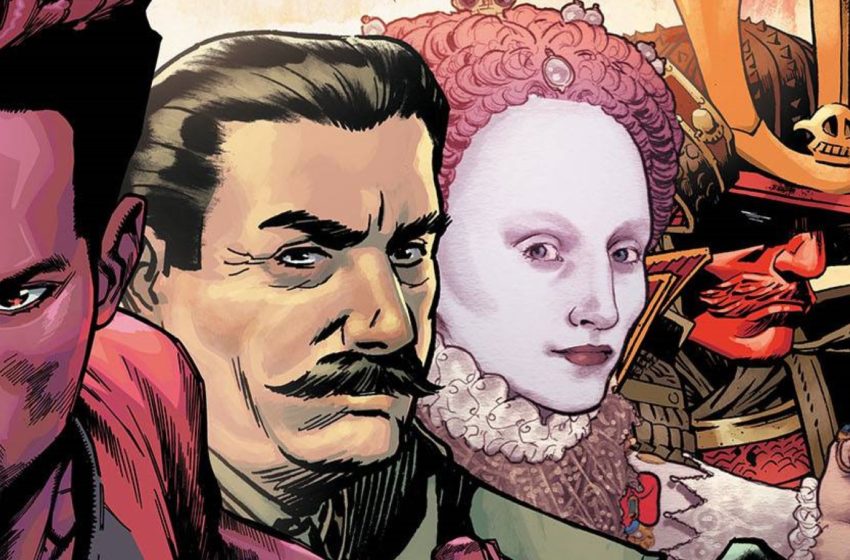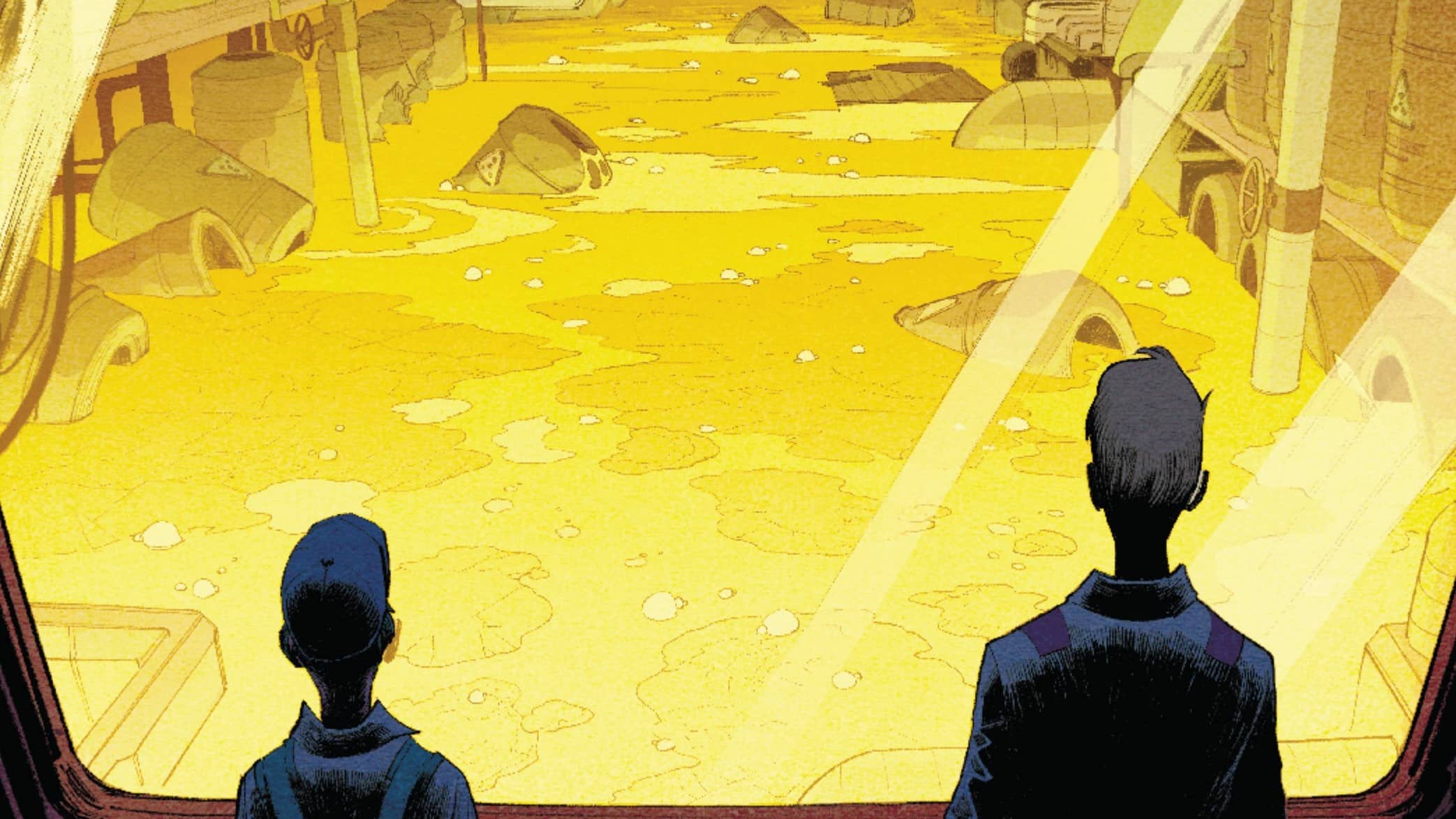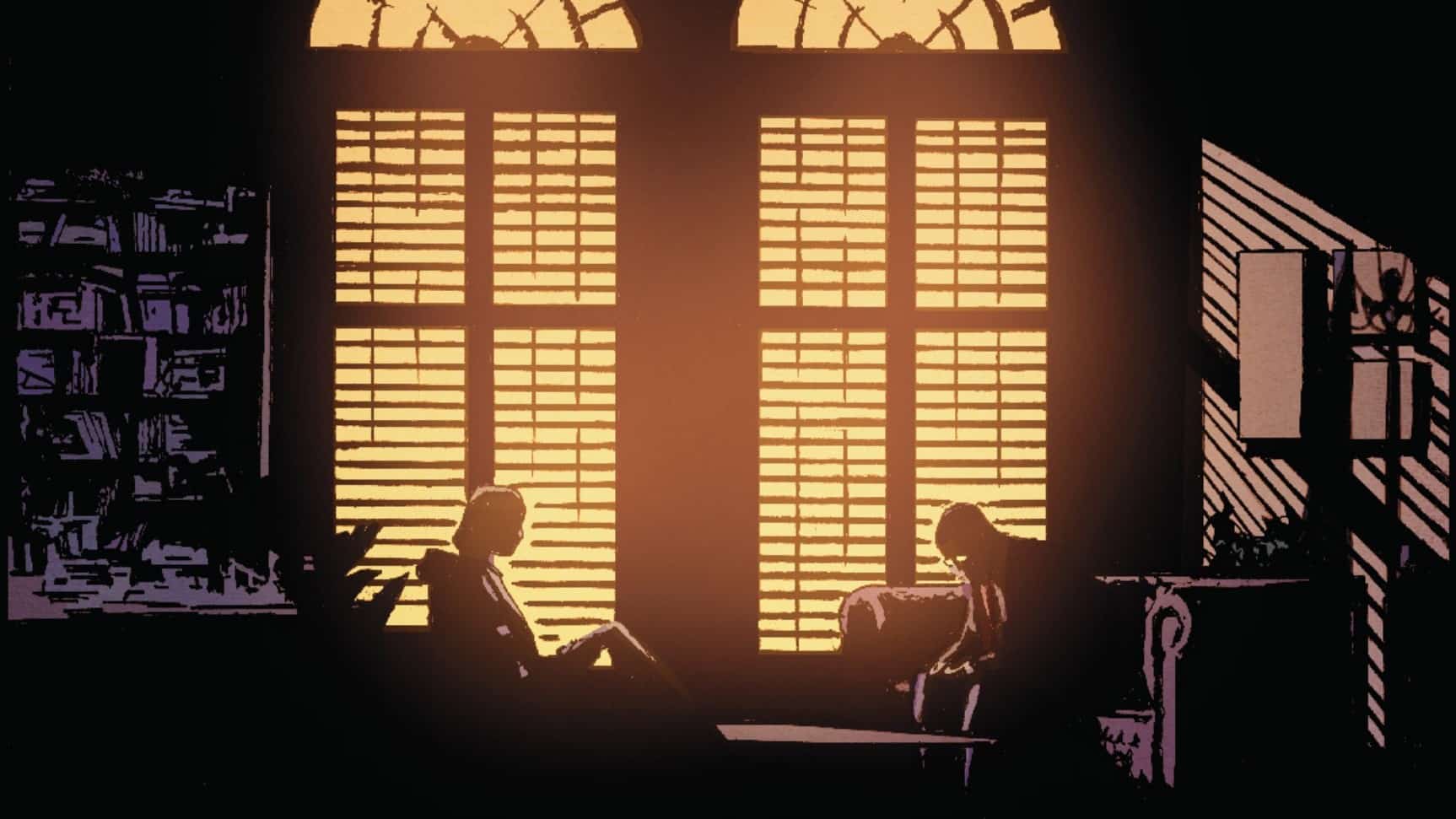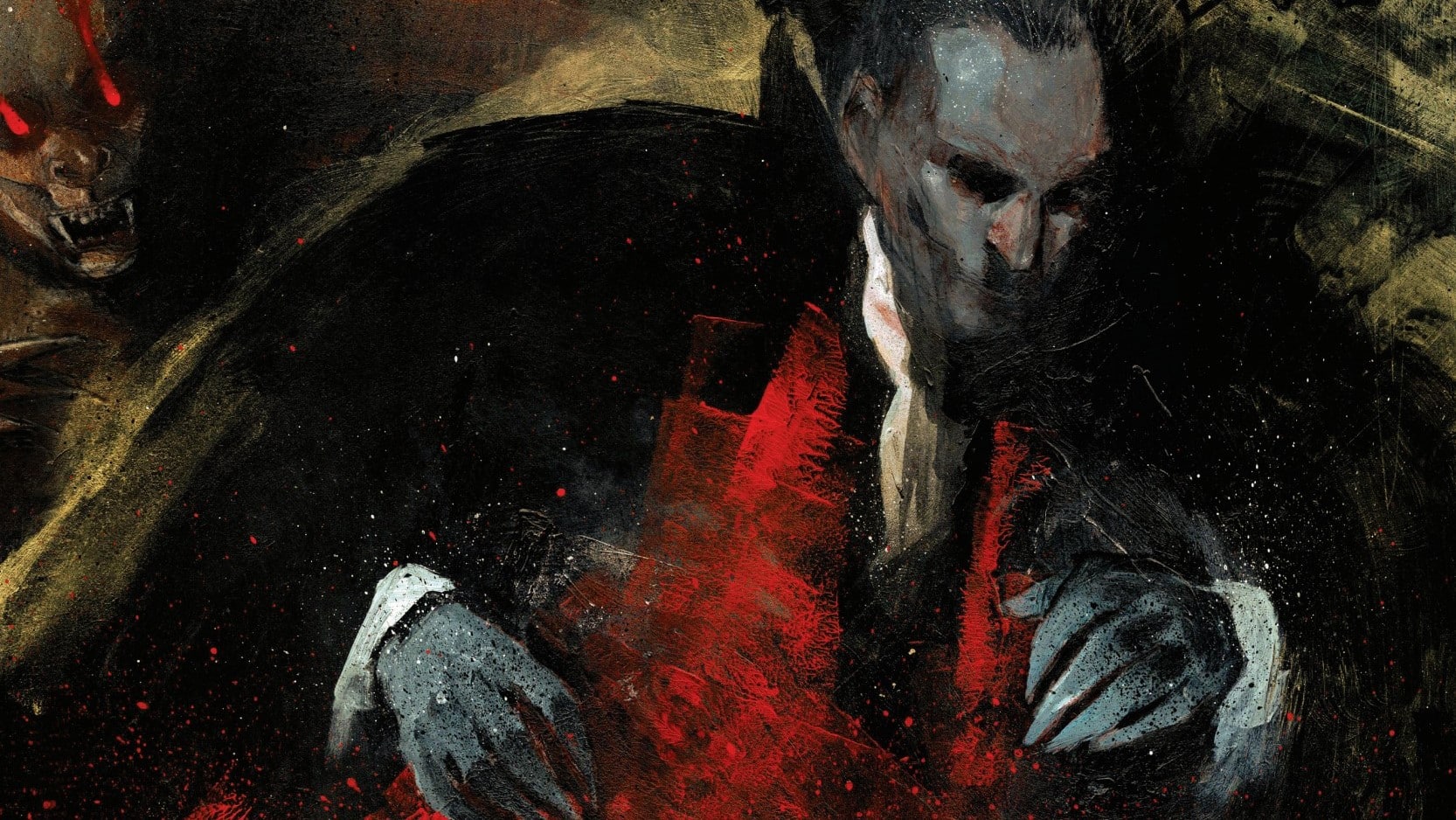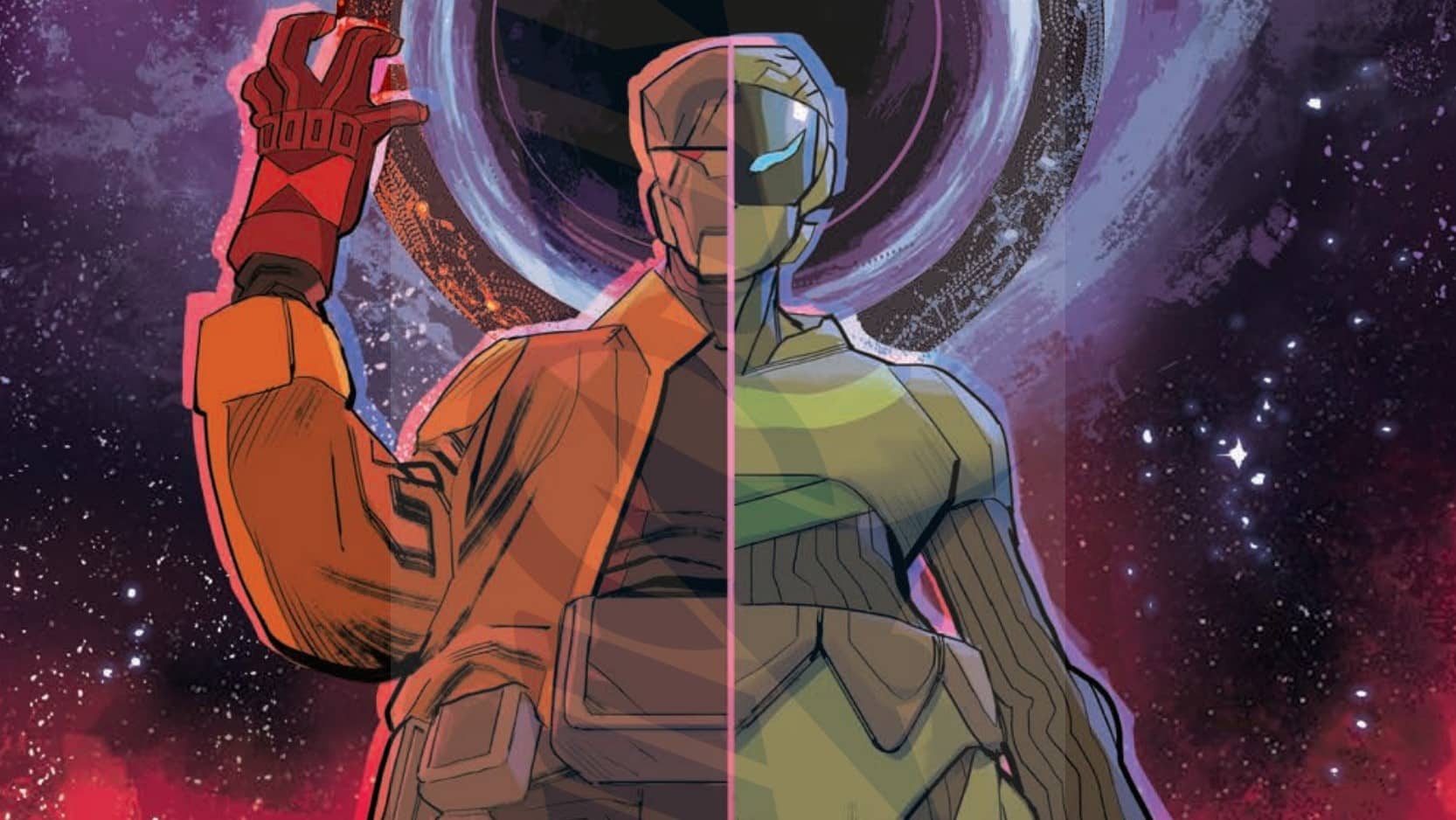Gods walk the Earth — and have always done so, from the moment life crawled out of the ocean, hidden hands influencing events throughout history. The biggest catch — they do not necessarily know who they are. Christopher, a young man of 22, does not know anything about the war of eons he’s been a part of in his previous lives — but that war’s about to come to his doorstep in ways he can’t ignore. Written by Kyle Higgins, drawn by Felipe Watanabe, colored by Frank William and lettered by Clayton Cowles, with a backup prose story by Jana Quinn.
Armaan Babu: I love a good pantheon story. I love a mediocre pantheon story. I even love a fair number of bad pantheon stories, so while I’m not entirely sure where Ordinary Gods falls, I love the concept and am in for the ride. Hello, Ari! I have two important questions for you: One, how did you enjoy this issue, and two, based on the kinds of gods we see here, which one do you think you’d be?
Ari Bard: I think I landed very similar to you on this one, Armaan. I am also unsure of where the quality of this story will fall, but I do love the concept enough to buy into the first arc. There was a lot that evoked my curiosity while also keeping me relatively emotionally uninvested. As far as which one of the 13 territories I’d belong to, I would hope it would be inspiration, but I am honestly unsure. There are a lot of different characteristic territories here that aren’t necessarily all mutually exclusive, so I’m curious to learn more about the history of this massive world. What about you, Armaan?
Armaan: Regret. So much regret, I think being a God of it would be the one silver lining. One thing I do not regret, however, is being able to talk about comics, so let’s get right to talking about this one!
Myth-stakes Were Made

Ari: Ares could only dream! A world of gods always at war and governed by the very earthly and simplistic concept of sovereign political nations. This truly would be his paradise. But here we are, the gods have their realm, and sometimes they come down to Earth. They are loved. They are hated. In tw — shoot, wrong one. Here in the godly realm, there are subjects and rulers and attempts to overthrow governments, and it all has me confused. The rulers are gods, and the issue makes it clear that it would be difficult to overthrow them because of it, but aren’t the subjects … also gods? Who else lives here? This is actually the crux of my frustration with these elements of the story so far.
To be honest, this doesn’t feel grandiose enough to exist on this godly scale that they’re clearly going for. It’s so grounded in very contemporary notions of human political power that it actually becomes trapped in these restrictions. Are these ruling gods just so powerful that an entire kingdom of rebelling subjects can’t stop them? This is the inciting incident for the premise, and I’m worried that it’s where everything will start crumbling down for me. If you’re going to make this epic struggle of reincarnation, we need a motivation and a problem that makes some sense, and the structure of the godly realm simply does not for me. What about you, Armaan?
Armaan: So the way I’m seeing it, this new land we’re introduced to has (relatively) human subjects, and each of its kingdoms — denoting strength, savagery, regret and so on — is ruled by a God that embodies that particular concept in addition to overseeing a land whose people live by that idea. All of this, and the One King to rule them all, and in the darkness, bi- shoot, wrong one again.
As intriguing as the concept is, though, you’re right that it starts to fall apart as soon as you look closer at it. The biggest problem for me here is that the vagueness necessary for the mythic tone that Kyle Higgins is going for means we know very little about how things actually work — and what we’re actually told is confusing. Do these gods have powers beyond immortality? What kind of subjects do they have? Why aren’t the people of the Savagery country absolutely dominating this war, or is it only their god who’s savage?
You know what I wish this comic was? A TTRPG module. Scrap the story, and just give me hours with intricate details about this setting.
Ari: I really agree with this sentiment. The biggest thing this book could have used before this issue was, at the very least, a #0 or guidebook issue explaining the origins of the conflict, because the gaps of information we have right now are not a mysterious source of captivation, but rather gaps providing a large amount of frustration behind a core component of the issue. These conflicts feel primarily mortal, and revolutions and rebellions are often successful, so the team should have made it clear why nothing has worked or changed after hundreds of years. If I were to make some contemporary comparisons, I’d say the story has the potential to be as fleshed out as something like The Last God, but instead it feels more like Seven Secrets. The art in these sections is epic, especially some of the super vibrant shades of blue that Frank William provides, but I’m going to need a little bit more understanding to absorb the scale being conveyed here.
Armaan: One thing I will give the mythic part of the book is how much I enjoyed its presentation. While the rest of the book’s story is told in single pages (and a prose bit at the end), the story of the gods is told exclusively in double-page layouts, and like you said, the art here is epic. The savagery of the large and murderous One King is striking. There’s a fadedness to the colors, mixed with hints of roughness in the art, that makes the pages that feature the gods seem a little aged. It looks almost like legends read off of parchment, even on our digital review copies. The glimpses of the other gods we get to see are exciting — I’m impatient to know more about them.
Unfortunately, we don’t get a lot of time with them before their spirits are shunted off to Earth. One of the biggest problems with the Rebellion was that killed gods kept coming back — so the Innovator sought to confine them to another planet a long, long time ago, in a galaxy far, far aw- shoot, sorry, wrong one again.
A betrayal from one of the One King’s agents sent our Rebellion gods to Earth instead — and apparently they’ve been reincarnating from body to body ever since, though the mechanics of how that works isn’t quite clear. Nevertheless, this is how we meet a Mr. Taoka — and, not long after, his reincarnation into our protagonist, Christopher.
Tales of a 22 Year-Old Nothing

Ari: Alright, so Christopher appears on Page 11 of this issue and, in my opinion, it should have been Page 1. Christopher is the biggest draw of this first issue, and it has really made clear to me what Higgins’ strengths are as a writer. In Ordinary Gods, Higgins shines in writing the uncertainty of a character in their early 20s, which I feel like is an age we don’t often see a lot. It’s also an age that resonates rather heavily since I am 22. This discussion Christopher is having with his therapist? I get it. I feel like myself and a bunch of my friends all feel like we were sucked into this game of capitalism that promised to spit out economic stability in return for years of sacrifice in the form of discipline and academic rigor, and we only realized what was going on once so much already felt locked in. Now, obviously Christopher has a lot of other underlying issues going on, but that wide panel at the bottom of the page where Christopher and his therapist are just sitting in silence? I felt that. I really felt that. Christopher is the heart of this story. Lead with that.
Armaan: I agree. Between the shootout the book opens with and the start of the exposition myths, it takes way too long to get to our protagonist. After all the epicness and the action, the quiet, mundane moments really shine. I’m a little mixed on the art — a lot of the facial close-ups come off as awkwardly drawn, but when the camera pulls away, things are framed beautifully. There is a lot of detail put into the backgrounds that really sells how real each scene feels, and the simple, regular pacing of these ordinary moments is well considered. Those quiet, wide panels really land.
I also really enjoy the little details added into conversation — Christopher’s little sister is a big fan of some in-world fantasy book, Christopher’s cynicism, how comfortable and close he seems to his family. We’ve seen the gods, we’ve seen the ordinary and I’m loving both. It’s only the overall story that isn’t quite holding together.
As I mentioned before, though we, the readers, know that Christopher is a reincarnated god, it’s a little confusing as to how that actually works. His previous incarnation didn’t seem to know anything about that, and his current incarnation seems to have a completely different personality — nothing we can see that ties him to either Masato Taoka or the Luminary he’s revealed to be later.
Ari: You’re right in that the more intimate details definitely add so much to the story. Christopher’s family is fantastic. Their banter and honest discussions and vulnerability shine through in every scene. It’s so candid that it’s easy to forget you’re a reader or an “audience member” and not getting some private peek into someone else’s life. The corny jokes and sibling banter all give weight here until the gravitational energies of the earth plane and the godly plane collide in some unexpected and violent ways.
A Yeeting of Souls

Armaan: So I’m a little confused here.
We are told the gods’ spirits were sent to Earth way back when, as life was just beginning to crawl out of the ocean. We’re shown violent happenings through history, atrocities, and the implication seems to be that the gods were responsible for it, but it’s so vaguely put that I’m not sure. If the gods of the Rebellion were the ones sent to Earth, why are they committing atrocities against each other? Were all the gods — rebellious and otherwise — sent to Earth? If they don’t know who they are when they incarnate, how do they even find out?
That last bit is especially pressing, because just as Christopher seems on the verge of understanding his own hidden godhood, his sister reveals that she’s more than she appears, and slaughters their family right before Christopher’s eyes.
Ari: Oh boy, this is where we dive right off a cliff and into the deep end. All of your questions are also ones that I have. Hopefully by writing down my understanding, we might both be able to shed a little light as to what’s going on here. It seems as though the gods leading the rebellion were tired of this stagnation, so the Innovator, a god on the side of the Rebellion, makes a machine to trap the immortals. It does this by … I believe the technical term is … yeeting their souls across astral planes into Earth, which simultaneously traps them and injects life and kickstarts evolution at the same time. Now, the Rebellion was hesitant about the morals of this machine, but somehow the One King also got a hold of it and used it to trap the five rebellious immortals on Earth. Now, since these gods kickstarted planetary evolution, maybe they taught humanity violence through these atrocities? Maybe they didn’t know what was going on? This is where all of your questions and more come in, and we could talk for pages about the confusion brought on by the mechanics of this inciting event.
Instead, let’s talk about the inciting event for Christopher, where his little sister, who is 12 Earth years old, violently kills Christopher’s parents and attempts to kill him as she reveals she is also likely some reincarnated god. I’m just going to say it: This made me extremely uncomfortable in a very bad way. This was a flat-out bad decision for Higgins. To start off, I personally despise the trope that the only way for chosen individuals to wholeheartedly commit themselves to something is to forcibly sever their connections to any current life they may have. I think that is a sign of weak and destructive narrative building as opposed to more foundational intentions often built upon difficult choices that may give the protagonists more agency. Now add on top of that what this creative team built in the opening pages of this first issue.
Ordinary Gods #1 contained a strong and complete familial love that, to be quite honest, we don’t see very often in comics today. Not only that, it was a strong and complete familial love for a family of color, which is even rarer. Higgins destroyed that in a very implosive and traumatic way that did very little to further this story. I may not be able to speak much as to the impact that choice may have on people of color reading this story, but I can say I felt disgusted after reading that scene.
Let’s be honest, this story contains plenty of familiar elements all amalgamated together with various degrees of success. The self-destructive traumatic inciting incident here did a lot more harm than good.
Armaan: I don’t think I could have put it better myself, Ari. This was absolutely the wrong move for the book to have made, and it’s especially regretful considering how well this family was portrayed even in the relatively limited space we had with them. What do we gain from this? Shock value, and a Christopher untethered by family while motivated, to some extent, by revenge. It’s something we’ve seen far too many times, and as a narrative choice, it’s lazy. I would have been a lot more excited to see Christopher having to deal with his godhood — and his sister’s apparent evil godhood — if he had to face it with his family.
Instead, Christopher’s main ally is an action-oriented rebel spy from the realm of the gods who appears to have no interest in humanity. In fact, Dominic apparently believes the only way to save the realm they come from and free the gods trapped on Earth is to destroy the planet — and he needs Christopher’s help to do so.
It’s hard to imagine any scenario in which Christopher would agree to that. It’s a big way to end the comic, but those stakes immediately diminish the moment if you dwell on it for a moment or two.
As we’ve discussed, there’s a lot to enjoy in this comic, but there have also been a lot of storytelling choices that are clear mistakes. I’m definitely interested enough to want to read the next issue, but would I confidently recommend this series based on this issue alone? I would not.
Ari: Neither would I. Granted, I could see how I would absolutely eat this up if I was just hearing a pitch. They say that anyone can come up with a great big idea for a story, and that it’s actually sitting down and executing it that matters. Ordinary Gods is an idea I could see playing out great, even as a detailed pitch document. The problem is that there were so many wrong turns in this first issue that I’m even more worried about what’s to come instead of excited for it. Keep in mind there are a bunch of teases for a lot of retconned history with gods as pivotal players coming our way, which always tends to alert the bullshit detector. The creative team has lost a lot of goodwill and dug a very deep hole for themselves. Let’s see if they manage to climb their way out.
Miscellaneous Mythgivings
- Jana Quinn’s backup story at the end of the issue, a prequel about Christopher’s previous incarnation as a Japanese gang leader, did not make much of an impact with either of us.
- I (Armaan) have to know — is the grass actually greener in the nations on the other sides of Envy?
- Our savage, warring One King looks a lot like a certain other God of War — all he’s missing are some Blades of Chaos.
- The first Russian translates to, “I won’t trade a lieutenant for a field marshal.”
- The second Russian translates to, “He is not my son. You won’t get anything.”

